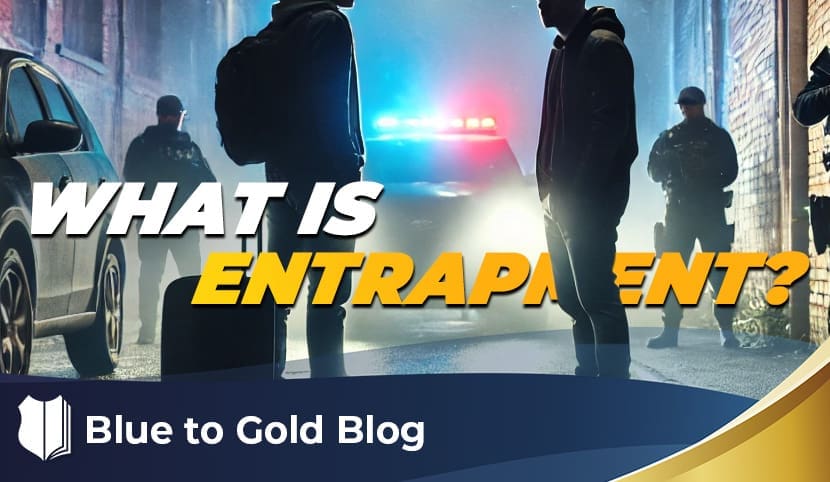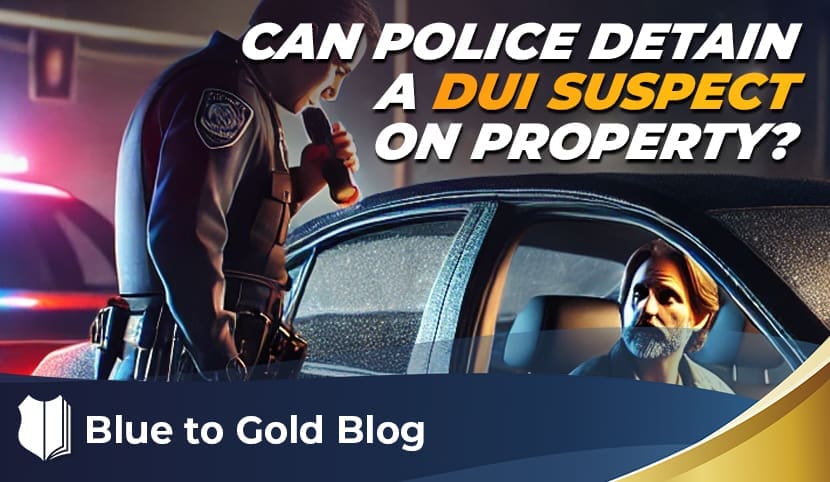This questions comes from an officer in Nebraska, and the topic is: What is entrapment?
Let’s break it down. Entrapment occurs when law enforcement officers engage in behavior so extreme and over-the-top that they essentially harass someone into committing a crime. However, simply giving someone an opportunity to commit a crime is not entrapment. Courts expect people to say “no” when asked to commit a crime.
Example 1: Not Entrapment
Let me give you an example. Say an undercover officer attends a party and starts asking people, “Do you have any drugs? Do you have drugs? Do you have drugs?” Eventually, someone says, “Yeah, I’ve got drugs.” The officer then explains, “I need them for my mom. She’s in a lot of pain, and the doctor cut her off. I just need some opioids for her.” The dealer, feeling sympathetic, sells the drugs to the undercover officer.
Is this entrapment? Absolutely not. The officer merely gave the dealer an opportunity to commit a crime. Sure, the officer lied and tried to pull on the dealer’s heartstrings, but that’s not enough to qualify as entrapment. Courts expect people to say, “I feel bad for your mom, but I’m not selling you drugs.” That’s just how it works.
Example 2: Likely Entrapment
Now, let’s change the scenario. Suppose the undercover officer believes a specific person is a drug dealer. The officer approaches them and says, “Hey, my mom is really sick, and I heard you have some pain meds. Can I buy some from you?” The person responds, “No, I don’t sell drugs.”
But instead of stopping there, the officer returns to the person’s apartment every day for two weeks, begging and pleading: “Please, my mom is in so much pain. I’m desperate.” Finally, after two weeks of relentless harassment, the person gives in and sells the drugs just to get the officer to leave them alone.
In this case, the officer’s behavior would likely be considered entrapment, as they overcame the person’s initial resistance through harassment.
Applying This to the Firearm Scenario
Now that we’ve established the basics of entrapment, let’s look at the fact pattern provided by the officer from Nebraska.
A confidential informant (CI) contacts the police and claims they can set up an individual who is prohibited from possessing a firearm. The CI tells the officers, “I know someone who has a gun, and I can help you catch them in the act.” The plan is for the CI to tell the target (the defendant) that she has a beef with her boss and needs the gun for protection—or possibly to use against the boss.
The defendant, who is prohibited from possessing firearms due to a domestic violence conviction, agrees to bring the gun to the CI. The police, believing the defendant might have a firearm based on social media posts, work with the CI to set up a meeting point (e.g., a gas station). They wire up the CI, drive her to the location, and monitor the exchange. If the defendant brings the gun to the meeting and hands it over to the CI, the police move in and make the arrest.
Is this entrapment? No, it’s not. Courts expect people to have the ability to say “no” to committing crimes. In this case, the defendant made the decision to bring the gun, knowing full well it was illegal for him to possess it. The fact that the police gave the CI a ride to the meeting point or helped facilitate the operation doesn’t amount to the kind of harassment or coercion required to prove entrapment.
A Potential Complication
That said, let’s tweak the facts slightly. Suppose the CI pleads with the defendant, saying something like, “Please, my life is in danger. I could be killed if I don’t have this gun.” If the defendant only agrees to bring the gun because he genuinely believes the CI’s life is at risk, that could be problematic. This kind of emotional manipulation—fraud or deceit so overwhelming that even an innocent person might feel compelled to act—might rise to the level of entrapment.
However, based on the facts provided, I don’t see any indication that this is the case here. It seems like the operation is on solid legal ground.
In Summary
Entrapment requires extreme and repugnant behavior by law enforcement, and it’s rare for courts to find that standard met. In the firearm scenario described, the defendant voluntarily chose to commit a crime, and there’s no indication of harassment or coercion. Therefore, this does not qualify as entrapment.
As always, I’ll see you next time. Stay safe!





